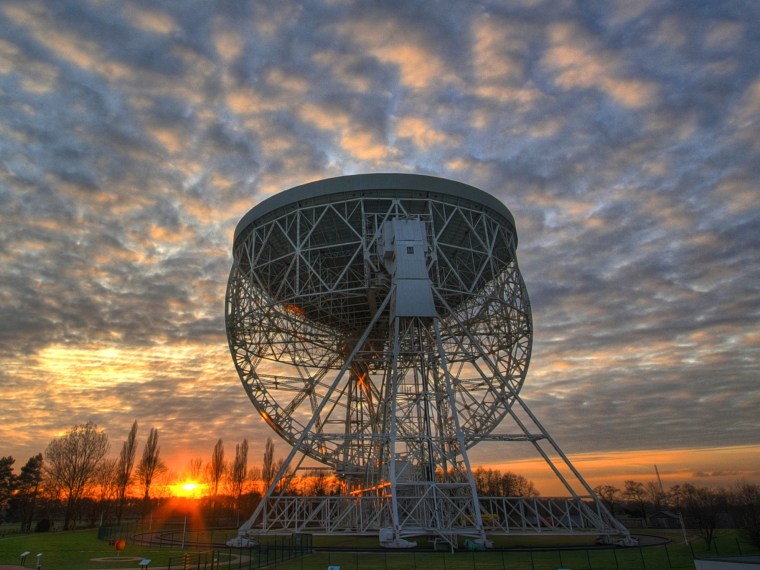
British astronomers have launched a new effort to boost the United Kingdom's search for extraterrestrial intelligence, or SETI.
"At the moment, America's the place that does it. There's no other place that comes close. We want to become No. 2," Alan Penny, an astronomer at the University of St. Andrews who is coordinator of the UK SETI Research Network, told NBC News.
The new network, also known as the UKSRN, would coordinate research into the issues surrounding the SETI quest and seek time on radio telescopes and other observation facilities to look for signals matching what would be expected from alien civilizations.
The network's patron is Britain's Astronomer Royal, Sir Martin Rees. The leaders of the effort announced the UKSRN's launch on Friday at the Royal Astronomical Society's National Astronomy Meeting in St. Andrews, Scotland.
Britain's alien quest
British facilities such as the University of Manchester's Jodrell Bank Observatory have long played a role in SETI.
"The first proposal to search for radio signals from extraterrestrial civilizations was actually inspired by the construction of the Lovell Telescope at Jodrell Bank. We went on to take part in the SETI Institute's Project Phoenix from 1998 to 2003, searching for signals from about a thousand nearby stars," Jodrell Bank's Tim O'Brien said in a news release. "At that time, the equipment required to sift through the data was expensive and unusual, but our modern telescopes are potentially capable of conducting these type of observations as a matter of course."
Jodrell Bank is now part of a seven-telescope radio astronomy array known as e-MERLIN. That array could be used for SETI even while other, less out-of-this-world research projects are in progress, astronomers said. In addition to the radio search, a wide spectrum of other initiatives have been proposed — ranging from devising new analytical methods for deciphering intentional messages from outer space, to detecting large artificial structures using the same transit method that's currently employed to find extrasolar planets.
"While the odds of seeing megastructures are probably very low, we will soon have a huge archive of exoplanet data to search for these objects — at no extra cost to SETI scientists," said Duncan Forgan of the Royal Observatory Edinburgh.
The money issue
Penny said the UKSRN was in the process of putting together a funding proposal for the British agencies that fund astronomy research. He told NBC News that the initial request could be in the range of $250,000 a year for a couple of dedicated research fellows, but the BBC said the UKSRN plans to ask for about $1.5 million a year (£1 million) for telescope time and data analysis.
The world's highest-profile search for alien signals is being conducted by the California-based SETI Institute, using the multimillion-dollar Allen Telescope Array in Northern California. Millions of dollars are being spent on that search — but all of that money comes from private contributions, such as a $3.5 million donation that was announced last November. NASA hasn't funded the alien search directly since 1993.
Penny acknowledged that it would be challenging to get government funding to search for alien signals, particularly in an age of tighter research budgets. But he said that taking the SETI Institute's private-funding route would be difficult as well. "Britain doesn't really have a culture of private funding of the physical sciences, like in America," he said.
However the effort is paid for, the search for alien civilizations should be part of Britain's research agenda, Penny said.
"It's the biggest question you can ask: 'Are we alone?'" he said. "If we are alone, then we're the whole point of the universe. If we aren't alone, there are other civilizations, more advanced, that might be able to help us along. It's very exciting ... but it's very uncertain. That's why the funding agencies or individuals haven't put in a lot of money. We want to change that, in a small way."
More about the alien quest:
- Gallery: 50 years of searching for E.T.
- Biggest search for E.T. is yet to come
- Drake Equation calculator: Figure the odds for E.T.
- NBC News archive on aliens
Alan Boyle is NBCNews.com's science editor. Connect with the Cosmic Log community by "liking" the NBC News Science Facebook page, following @b0yle on Twitter and adding +Alan Boyle to your Google+ presence. To keep up with Cosmic Log as well as NBCNews.com's other stories about science and space, sign up for the Tech & Science newsletter, delivered to your email in-box every weekday. You can also check out "The Case for Pluto," my book about the controversial dwarf planet and the search for new worlds.